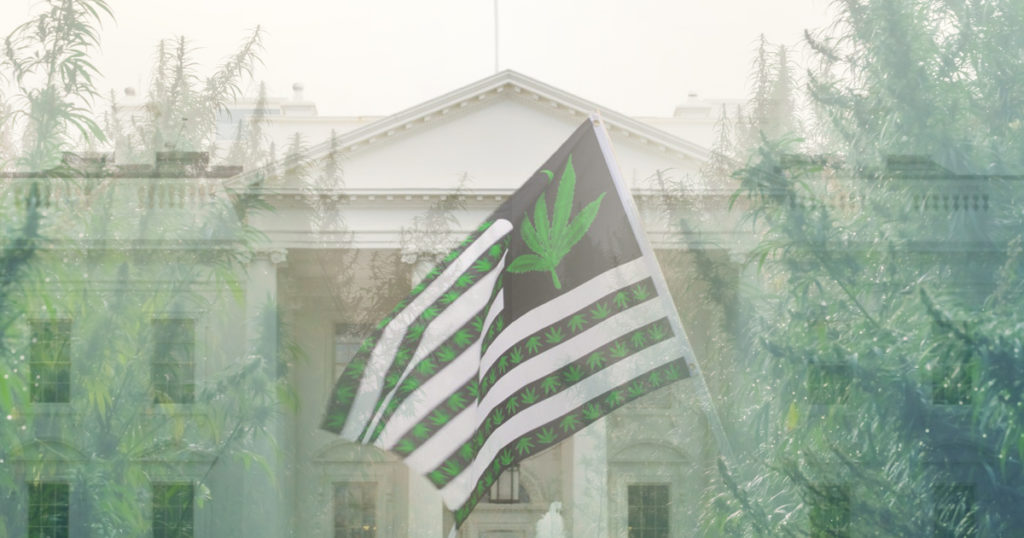In a typical year, the federally funded Small Business Administration (SBA) doles out an average of 50,000 low-interest loans to American companies to the tune of roughly $30 billion annually. This year, due to the massive impact of COVID-19 on small businesses nationwide, the SBA has been tasked with nearly doubling that yearly output in a matter of months as the entire economy hangs in the balance. Although at least $50,000,000,000 is being shoveled back into the economy to avoid collapse, one multi-billion-dollar industry finds itself totally ineligible for such a bailout. Can you guess which one?
Cannabis is now “legal” for adult recreational use in 11 states plus the nation’s capital in the District of Columbia. New Jersey and Arizona are likely going to add their names to that list in November. 33 states plus D.C. have “legalized” medical cannabis to varying degrees.
While this patchwork of cannabis laws and markets looks different from state to state, one thing they all have in common is the ongoing discrimination from the federal government of the United States which still lists cannabis as a Schedule I narcotic, rendering it highly illegal and subject to strict prohibition. This despite the “essential” status given to the weed-fueled markets in states where the commerce surrounding the plant is being heavily taxed and regulated.
The man currently serving as President of the United States is the oldest to have ever been elected to the position and he has shown absolutely no interest in advancing cannabis reform at the federal level. In fact, he recently warned his base that putting cannabis reform on ballots hurts his chances at re-election.
The man running to unseat him is even older and has only recently, reluctantly, veered from his long-held stance that cannabis is a gateway drug as his entire party tries to drag him toward the popular polling plant.
It’s hard for cannabis activists and advocates to get excited about spending the next four years under either one of them, but it is important to remember that it isn’t the president (Executive Branch) who writes the laws, it is the elected members of the House and Senate in the Legislative Branch that put that work in.
The MORE Act is a great example of what it takes to advance a historically taboo subject such as cannabis to the highest levels of lawmaking as it broke through every barrier before it in 2019 on its way to a full congressional vote on the House floor later this month.
What is the MORE Act? What would its passage mean for cannabis reform?
We will answer those questions and more and then we’ll give you a call to action to help put political pressure on those who oppose this historic bill.
The Marijuana Opportunity, Reinvestment & Expungement Act (MORE)
First introduced on July 23rd of 2019, the MORE Act is a bipartisan piece of legislation whose main thrust is to remove the cannabis plant from the Controlled Substances Act completely, also known as de-scheduling.
This, of course, is what the feds did in 2018 with the “hemp” plant which is, of course, just cannabis bred with only trace amounts of THC but they couldn’t even get that right so it remains to be seen how exactly this legislation, if successful, would impact the flourishing cannabis reform movement.
The language of the MORE Act officially reads:
This bill decriminalizes marijuana.
Specifically, it removes marijuana from the list of scheduled substances under the Controlled Substances Act and eliminates criminal penalties for an individual who manufactures, distributes, or possesses marijuana.
The bill also makes other changes, including the following:
replaces statutory references to marijuana and marihuana with cannabis,
requires the Bureau of Labor Statistics to regularly publish demographic data on cannabis business owners and employees,
establishes a trust fund to support various programs and services for individuals and businesses in communities impacted by the war on drugs,
imposes a 5% tax on cannabis products and requires revenues to be deposited into the trust fund,
makes Small Business Administration loans and services available to entities that are cannabis-related legitimate businesses or service providers,
prohibits the denial of federal public benefits to a person on the basis of certain cannabis-related conduct or convictions,
prohibits the denial of benefits and protections under immigration laws on the basis of a cannabis-related event (e.g., conduct or a conviction), and
establishes a process to expunge convictions and conduct sentencing review hearings related to federal cannabis offenses.
Step One… of Many
De-scheduling the plant is a great start at the federal level and would effectively pull what few teeth the DEA has left when it comes to cracking down on state-level cannabis operations.
Without the regurgitated, scapegoat, fallback position of “well it’s a Schedule I substance soooo…”, hesitant state lawmakers whose constituencies are demanding cannabis reform will be forced to argue on merits if they decide to oppose such reform.
Another traditionally anti-cannabis organization that would be forced to take an honest look at cannabis as medicine should the MORE Act be signed into law would be the Veterans Administration (VA). No longer could they nod toward Big Brother in D.C. anytime a military vet wanted to try state-sanctioned medical cannabis instead of a cocktail of dangerous pharmaceuticals.
In fact, the MORE Act addresses this problem specifically, expressly allowing VA docs to openly discuss medical cannabis with veterans who reside in states where they can legally obtain it.
We hit up our friend and U.S. Army veteran Eric Goepel, co-Founder of the Veterans Cannabis Coalition, and asked him what the MORE Act would mean for vets like him.
Goepel is a “big picture” type of thinker and activist and so it came as no surprise when he made a larger connection for us, saying, “De-scheduling cannabis effectively ends federal prohibition, meaning the basis for criminalization no longer exists. At the federal level, that impacts immigration, employment, housing, firearm ownership, and healthcare for veterans and every other person in the country.
Immigrants, whether documented or undocumented, who use cannabis or work in the cannabis industry are at risk of deportation because of cannabis’ Schedule I status. De-scheduling ends the federal government’s ability to use cannabis as a discriminating or disqualifying factor. This would affect veterans who are immigrants themselves and still pursuing citizenship as well as family members who are at risk because of their status.
The federal government employs approximately 2 million people–from postal carriers, to park rangers, to agricultural inspectors–with 1/3 of them being veterans. De-scheduling cannabis means that it can no longer be used to deny or terminate employment based on past or current use. Veterans and other patients in federal service who have abstained from cannabis because of fear of losing their jobs will no longer be forced to choose between the legal prescription pharmaceuticals that don’t work/create debilitating side-effects and cannabis which may offer more medical benefits at less risk.
When it comes to assistance programs, Pell grants, Supplemental Nutrition Assistance Program (SNAP), Temporary Assistance for Needy Families (TANF), housing assistance (including HUD-VASH (Veterans Affairs Supportive Housing), and other federal programs who bar individuals with cannabis convictions (state or federal) from applying will now be available, and current use will no longer be grounds from removal.
Technically, everyone who uses cannabis, for any purpose, and possesses a registered firearm is committing a felony that is grounds for imprisonment. Some veterans have stayed in the illicit market or avoided patient registries or programs because of this legal danger. De-scheduling removes that risk.
Finally, healthcare… De-scheduling clears the way for robust cannabis and cannabinoid drug research and development across private, state, and federal sectors. Ultimately, the goal will be to produce an array of Food & Drug Administration (FDA) approved cannabis or cannabis-based treatments that can be covered by Medicare/Medicaid and included in the Department of Veterans Affairs formulary. De-scheduling removes barriers for federal agencies with a great deal of expertise and capacity to produce new medications, including the Departments of Veterans Affairs, Health & Human Services, and Defense.”
De-scheduling cannabis will have a ripple effect across the country, as Goepel explains. Aside from the mandate for the VA, the new law would also instruct the Small Business Administration to open its doors to the cannabis industry with affordable business loans to help startups in good times, and help established small businesses in times of need.
Expungement from the Top, Down
The MORE Act, as written, would also create a channel for the federal government to fund cannabis-related expungement, social equity, and community reinvestment programs and grants – a precedent-setting first in American politics should it succeed.
Democratic presidential candidate Joe Biden has ensured that the federal government will pump funds into state-sanctioned cannabis expungement efforts and his running mate for Vice President Senator Kamala Harris of California is the lead sponsor of the MORE Act.
Despite 62% public support for the MORE Act, and even higher (67%) when the question is asked more broadly about supporting cannabis “legalization” nationwide, there is only one Republican co-sponsor on the bill, Rep. Matt Gaetz (R-FL).
Gaetz has shown black sheep support for cannabis reform in the past and recently said that he would hold his nose and vote in favor of the Democrat-crafted MORE Act, but that the “reparations” (the word he chose to describe social equity) would likely be too much to ask of his Republican colleagues.
The last time the MORE Act was up for a vote was in November of 2019 when the House Judiciary Committee made history with a bipartisan 24-10 vote to advance cannabis de-scheduling legislation further than any had gone before it.
The common line of thought, however, is that the two final and crucial votes – in the House/Congress and then in the Senate – will fall almost strictly along party lines with the Democratically-controlled House passing the bill as written, and Mitch McConnell’s Republican-led Senate killing it without any attempt at reconciliation.
One of the best political lobbyists that the cannabis movement has, Goepel knows all about the long game and the big picture and he is not ready to concede any ground to anti-cannabis legislators who may try to weaken the bill to make it more palatable to prohibitionists.
He told us, “Even though the MORE Act is an incomplete solution, it’s a 180-degree pivot from the current law and a necessary step toward delivering on the promise of cannabis as both an industrial and medicinal product. The bill does not create a uniform legal cannabis environment across all 50 states.”
Goepel continues, “So, for those of us who want to see every patient in every city in every county in every state have equal access to quality and affordable cannabis, whether it’s through a prescription or over the counter of a pharmacy or dispensary, the work will not be done. It does not answer important federal questions about interstate commerce, import and export, quality standards, and many other important areas that are necessary to address. Nor does it end the onerous taxes and business regulations individual states like California have created.”
For these reasons, we simply cannot compromise anymore. We have for far too long and as Goepel points out, we still are even with this monumental bill.
The House vote is said to take place sometime this month and we will know those results well before the November election. Take note of who votes how. Take note of who uses long-debunked anti-cannabis talking points to stoke division over legislation meant to foster equality. Take note of what happens (or doesn’t happen) when this bill hits the Senate. Then make them all pay on November 3rd.
In the meantime, you can make your voice heard with your local lawmakers through this simple online form sponsored by Veterans Cannabis Coalition.
















